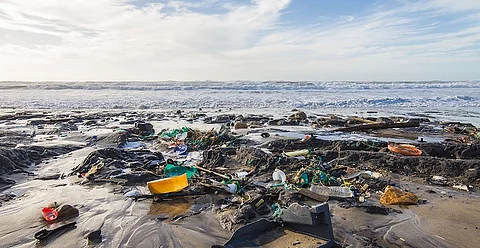

We are all going berserk about the plague of plastic, with the downside of this useful material becoming plainly obvious on land and sea. The Indian government has even banned single-use plastics aboard any ship calling at their ports, possibly on the grounds that it is possible to enforce the ban on a few sailors, where the population ashore would just ignore it.
It's the sheer tonnage and permanence of the stuff we throw away these days that is confounding us and is encouraging us to recycle more, which is a step in the right direction. And everyone surely knows that the sea isn't a rubbish dump, although that wasn't the case when I was growing up. My family hailed from a small island off the coast of England, where self-sufficiency was the norm and the dustman wouldn't bring his cart across the tide.
There was thus a sort of "midden" at the edge of the village, where everyone would throw their rubbish, to be swirled away by the next tide. It hasn't been used for decades (since the dustman started to call), and you can find all sorts of attractive pottery items, those old bottles with a marble in the top and the odd interesting artefact like a kitchen sink, if you dig in the sand these days.
But nobody was chucking away plastic waste in those times and beachcombing was a productive occupation. My uncle built a stout shed from timber dragged off the beach, and never paid to heat his house, with sea-coal and wood thrown up by the storms. Now, all you see is old synthetic nets and plastic bottles, polystyrene packing and even the fish boxes are made of blue plastic, disfiguring the shore.
Disposing of shipboard garbage has become almost a branch of the applied sciences, with complex formula to be followed, using umpteen different containers categorising the various wastes and a whole raft of regulations (different in all ports) increasing the bureaucratic burden hugely.
It didn't surprise anyone that a cruise ship collided with a container vessel some years ago, when the officer of the watch on the former was so preoccupied with the Garbage Reporting Form that he failed to notice the approach of the latter. Woe betide the ship where a sliver of plastic waste is discovered among the fish-heads by the vigilant inspectorate.
It used to be so much easier. The ship's rubbish, when in port, was collected in old 40 gallon oil drums, usually perched on the poop and with heavy wooden lids to deny access to the large and ravenous herring gulls that could identify a meal from 2000feet. I have watched one of those blighters seize the lid with its beak and with one mighty heave, chuck it onto the deck before diving with delight into the edible detritus of old chicken bones and leftover lunch.
The bins would, if we were lucky, be emptied by a man who came around with a rubbish wagon, or, in some ports a small barge that would hover under the stern while the gash was emptied into its hold. Then it was off our hands, and no questions were asked about its ultimate fate.
In one port on the St. Lawrence there were dire warnings about throwing rubbish into the river, with heavy fines for malefactors caught in this act of environmental crime. The rubbish lorry duly turned up, took the ship's wastes and then backed down the wharf to the end where it tipped the contents into the swiftly flowing stream. Maybe they didn't like the folk in the next town downriver.
There was also a garbage scow in a New Zealand port which used to do the rounds of the berthed ships and those anchored in the harbour, before heading out to sea, followed by a huge crowd of seagulls, before dumping the lot in the sea, supposedly several miles out.
They were not too fussy about the distance they went, and I can recall the people who lived on the nearby beaches getting very shirty about the crew of the garbage scow's "short cuts", as they rushed to get home before the pubs shut. There were angry letters to the papers.
We weren't as particular about what we put "over the wall" when at sea, but in a pre-plastic era, before MARPOL, there wasn't anything likely to do lasting damage to the marine environment. We dumped tons of old wooden dunnage, which I suppose washed up somewhere and might well have been useful.
It used to be said that the bottom of the sea along the main liner routes across the Atlantic and to the Cape were lined with all the cutlery and silver plates that recalcitrant stewards and galley staff couldn't be bothered washing up or polishing and chucked into the oggin. An awful lot apparently went missing on the homeward legs of the voyage.
Nowadays, seafarers, when they are not racking their brains over the garbage disposal regulations in the next port, are far more responsible than we ever were. Mind you, the port authorities could be more helpful than they are in some ports, placing the landside receptacles so far from the gangway that the crew need a morning off to dump the gash.
They still agonise about whether to make the service free at the point of use, or charge the ship for the service. They know that there are still mean minded ship operators who would make the ship store all their rubbish, until they got to a port where there was no charge. In rubbish disposal, as in life, you can never discount human nature.
